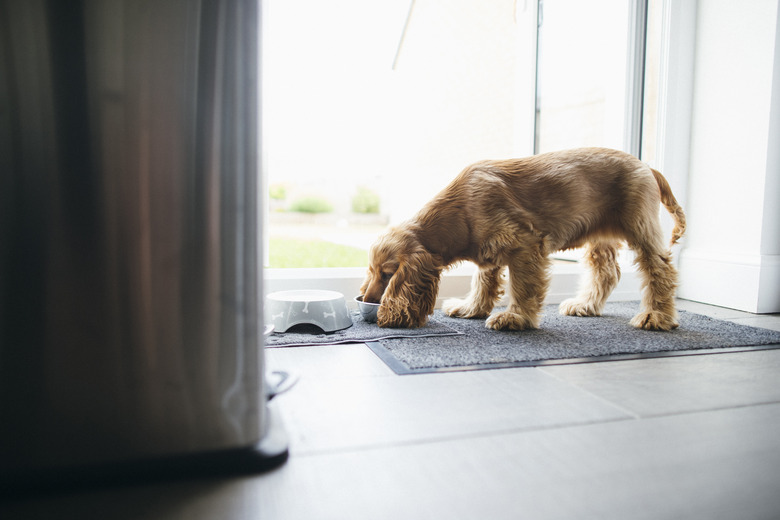Foods That Cause Diarrhea In Dogs
Usually, your dog seems to have an iron stomach, eagerly scarfing up table scraps within seconds. But all of a sudden, one day they get diarrhea. Could it be something they ate? It's definitely possible, as there are a variety of human foods, from cheese to chocolate, that may give dogs diarrhea or even worse symptoms. For instance, chocolate can be significantly toxic that causes more severe symptoms than diarrhea.
Dairy may cause digestive issues in dogs
Dairy may cause digestive issues in dogs
You'd be hard-pressed to find a dog who doesn't like cheese or ice cream. Just because they like it, though, doesn't mean it should become a regular food for them. Milk products aren't toxic to dogs, but many dogs do not produce enough lactase to break down the lactose found in dairy products. Cheese slices and other dairy products can trigger upset stomach in dogs, accompanied by a loose stool.
However, cottage cheese and yogurt in small amounts are fine to occasionally include in most dogs' diets. Yogurt's live bacteria, in fact, can benefit your dog's digestion. Note that only yogurt with live cultures will provide any probiotic benefit. Also, avoid giving your dog yogurt with artificial sweeteners.
If your dog needs probiotics on a daily basis or to treat GI issues or diarrhea, it's best to get dog-specific probiotic supplements from your veterinarian. Giving dairy products may worsen your dog's condition.
Not every dog is so lactose-intolerant that they can't eat a little cheese once in a while. You can offer your dog tiny amounts of cheese, cottage cheese, or yogurt and monitor their health. If they have no problems with their poop, the occasional tasty dairy snack is fine.
In the past, you might have heard recommendations to offer a bland diet of things like cottage cheese, yogurt, and white rice or brown rice to eat in small amounts to offset diarrhea since these are low-fat, easy-to-digest foods that also provide nutrients. However, most veterinarians won't recommend dairy as part of a bland diet for this type of treatment.
Risks of meat and fat in a dog's diet
Risks of meat and fat in a dog's diet
Wild dogs hunt and eat live prey, but domesticated dogs are different. Therefore, most veterinary nutrition experts do not recommend raw diets. The risks have less to do with the dog's digestive system and more to do with pathogens and incomplete nutrition.Feeding dogs raw meat and bones is not recommended because of the risks of illness from dangerous bacteria, choking, obstructions, and other injuries from bones, and a lack of nutritional balance.
Raw meat can be contaminated with harmful bacteria, such as E. coli, salmonella, or listeria, which can cause diarrhea. It may also contribute to the spread of antibiotic-resistant bacteria, which is a worldwide public health crisis. Raw bones should also not be given to your dog due to the risk of gastrointestinal obstruction and contamination with harmful bacteria.
Foods high in grease, such as fried foods, or those high in saturated fats can trigger dog diarrhea as well as a very serious illness: pancreatitis. Consuming trimmed fat from meats can also cause diarrhea or pancreatitis, as the dog is only ingesting fats and not any nutrients from the meat.
Dog diarrhea due to eggs and spoiled foods
Dog diarrhea due to eggs and spoiled foods
Just as humans should generally avoid raw or undercooked eggs, so should dogs. Salmonella bacteria in eggs can upset a dog's stomach and cause diarrhea and other gastric discomfort. If a food is runny at all, don't feed it to your dog. If you want to give your dog eggs, hard-boiled or scrambled are the best choice. Just keep an eye on them to make sure they don't show any adverse reaction.
Your dog's keen sense of smell means they might find tempting scraps of food in the garbage. When these scraps are moldy or spoiled discards, the result will often be a sick dog complete with those runny bowel movements. Don't tempt your dog with smelly foods they shouldn't eat. Make sure your trash is secure and out of reach at all times.
Avoid feeding these dangerous and poisonous human foods to dogs
Avoid feeding these dangerous and poisonous human foods to dogs
Certain human foods can be fatal or cause serious illness in dogs. For instance. even in small amounts, grapes and raisins can trigger vomiting and diarrhea as early symptoms of toxicity. These can progress to pain, lethargy, weakness, tremors, and kidney failure. Macadamia nuts cause weakness in the hind legs, lack of coordination, and depression in addition to gastric issues. Avoid feeding these foods to your dog at all times. If you think your dog ate any of the following, call your veterinarian immediately:
- Chocolate
- Onions and garlic
- Macadamia nuts
- Tomatoes, particularly the stems and leaves
- Avocados
- Grapes and raisins
- Raw bread dough
- Alcohol
- Foods containing caffeine or the artificial sweetener xylitol
The bottom line
The bottom line
Causes of diarrhea can vary, but what a dog eats is often the culprit. A wide variety of foods can give dogs diarrhea, like dairy products, spoiled food, and fatty foods. Raw meat contaminated with bacteria and foods humans eat, like chocolate, grapes, and garlic, are particularly harmful. To avoid issues of diarrhea from eating the wrong foods, it's best to feed your dog a high quality dog food, avoid fatty and dairy-based treats, and keep your garbage containers secure. Keep any foods your dog might be tempted to indulge in off of countertops where they can reach them and secured in cabinets and drawers.
